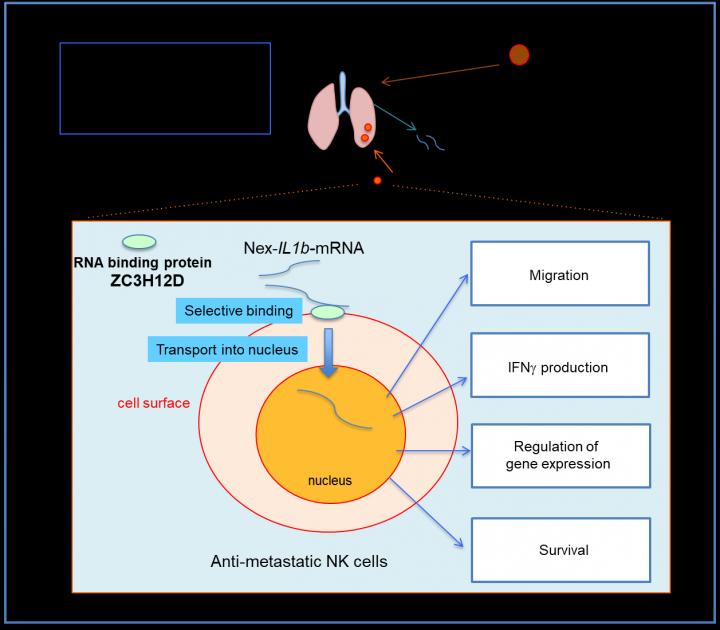A research group led by Professor Sachie Hiratsuka, Institute for Biomedical Research, Shinshu University, has found that a specific sequence of messenger RNA (mRNA), which exists outside cells, binds to receptors on the surface of natural killer (NK) cells and is taken up into the nucleus. The group found that NK cells with mRNA uptake are able to enhance their migration activity and interferon gamma production. Furthermore, NK cells incorporating the mRNA showed an inhibitory effect on cancer metastasis in animal experiments.
In recent years, the results of cancer treatment have been improving with the increase of medical technology. However, it is still difficult to effectively prevent cancer metastasis, so there is a need to develop new treatment methods. Cancer metastasis occurs when cancer cells in the body metastasize to other organs and grow again in those organs. The process is extremely complex, with various reactions occurring simultaneously, and it is difficult to say that we have enough basic knowledge at present.
In cancer metastasis, the cancer cells themselves undergo changes that increase their malignant potential, such as invasion of the surrounding tissues. At the same time, the target organ is in a condition to accept metastasizing cancer cells. Therefore, in order to prevent cancer metastasis, basic research is being conducted for a method that not only works directly on cancer cells but also works on the target organs.
Professor Hiratsuka’s research team has been conducting basic research on the role of immune cells and pulmonary vascular endothelial cells in lung metastasis using a mouse model of cancer metastasis. It was found that in the mice with a primary tumor transplanted subcutaneously, some NK cells stimulated by cancer tissue migrate from the liver to the lung. Furthermore, these cells were found to have the function of suppressing cancer metastasis in the lungs, and these cells were named “anti-metastatic cells,” but their molecular mechanism was not unknown. Therefore, the team decided to conduct research to elucidate the activation mechanism of anti-metastatic cells.
Messenger RNA exists inside the cell and is the blueprint for protein synthesis. Until now, it has been unclear whether mRNA also exists outside the cell, or if it does, whether it has any function other than making proteins. In this study, the group first showed the presence of mRNA in tissue-cultured medium. At the same time, they demonstrated anti-metastatic cells isolated from mice incorporated mRNA into their cells. The uptake of mRNA was attributed to the action of the ZC3H12D protein, which binds strongly to a specific part of the RNA called the AU-rich region. It was also found that the incorporated RNA was transported to the cell nucleus. Mouse anti-metastatic cells showed increased expression of genes resistant to death, activation of cell migration ability, and production of interferon gamma after incorporation of RNA. Furthermore, when the RNA-incorporated anti-metastatic cells were injected into mice, they inhibited cancer metastasis. These results indicate that some mRNAs are taken up by cells and transported to the nucleus, which may inhibit cancer metastasis. (Figure)
###
Media Contact
Hitomi Thompson
[email protected]
Related Journal Article
http://dx.





